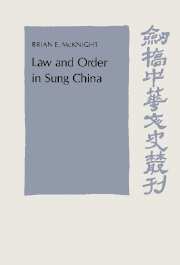Book contents
- Frontmatter
- Contents
- List of figures, maps, and tables
- Preface
- List of abbreviations
- 1 Introduction
- 2 The historical context
- 3 Crimes and criminals
- 4 Informal and semiformal agencies of law enforcement
- 5 Formal civil agencies of law enforcement
- 6 The role of the military in law enforcement
- 7 Supervision of law enforcement – the role of the intendants
- 8 Personnel selection
- 9 Urban crime and urban security
- 10 The Sung penal system
- 11 Jails and jailers in the Sung
- 12 Penal registration
- 13 The death penalty
- 14 Modifications of penalties
- 15 Conclusion
- Glossary
- Bibliography
- Index
1 - Introduction
Published online by Cambridge University Press: 23 December 2009
- Frontmatter
- Contents
- List of figures, maps, and tables
- Preface
- List of abbreviations
- 1 Introduction
- 2 The historical context
- 3 Crimes and criminals
- 4 Informal and semiformal agencies of law enforcement
- 5 Formal civil agencies of law enforcement
- 6 The role of the military in law enforcement
- 7 Supervision of law enforcement – the role of the intendants
- 8 Personnel selection
- 9 Urban crime and urban security
- 10 The Sung penal system
- 11 Jails and jailers in the Sung
- 12 Penal registration
- 13 The death penalty
- 14 Modifications of penalties
- 15 Conclusion
- Glossary
- Bibliography
- Index
Summary
Politics and law
This book is about social control. More specifically, it is about certain law-enforcement and penal institutions, practices, and policies used by the Chinese of Sung times to support the social order. It describes these institutions, practices, and policies during the Sung dynasty. It also tries to illuminate some of the ways in which they were shaped by the ideas and attitudes of the ruling elite, the fiscal situation of the state, the nature of the economy, political realities, local geography, bureaucratic skills, and technology. It seeks to show what functions these institutions, policies, and practices played in Sung society and why they were needed.
The topic also illuminates, incidentally, the character of the traditional Chinese state. Western thinkers on the origins and continuation of states are divided into two opposing camps. One tradition stresses the integrative nature of the state. From Plato and Aristotle to English writers of the eighteenth century to some modern sociologists like Talcott Parsons, these thinkers have emphasized the origins and continuing role of the state as a positive integrative system. Such thinkers tend to view stability and order as normal, with conflict an abnormal distortion of the natural order. The other tradition, more specifically modern, from Hobbes to Marx to some modern anthropologists like Maurice Freedman, sees the state as a system born out of violence and coercion. For such thinkers the state is created from conflict and continues as a mechanism by which the majority is subjected to external control through fear or force.
- Type
- Chapter
- Information
- Law and Order in Sung China , pp. 1 - 33Publisher: Cambridge University PressPrint publication year: 1992

